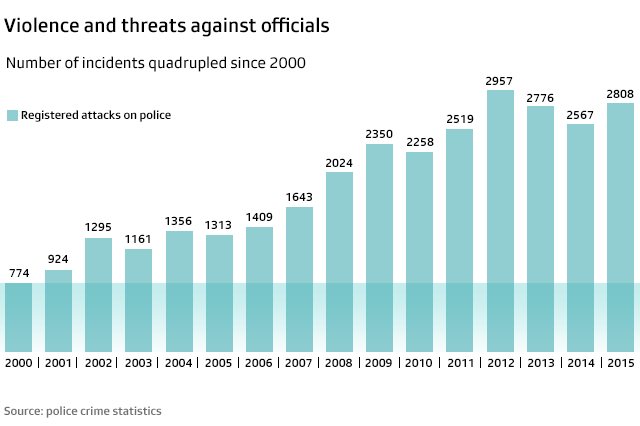
What statistics show and what they don’t

Increasing violence against police officers in Switzerland over the past decade keeps making the news. In the latest incident last week, a police officer was shot and wounded by a man they were trying to arrest in a rural region in the east of the country.
Ahead of the publication in March of the latest crime statistics, two Sunday newspapers featured reports and witness accounts of the violence against officers.
“Attackers are becoming more disrespectful and more brutal,” Johanna Bundi Ryser, president of the police officers’ association, is quoted as saying.
The SonntagsZeitung highlights a series of violent incidents, involving demonstrations, football hooligans, drivers caught speeding, late night revellers and quarrelling family members.
Based on statistics that came out last nearly ten months ago, the graphic shows that cases of violence jumped from 774 in 2000 to 2,080 in 2015, peaking in 2012 with 2,957 incidents.

However, Markus Mohler, a former police commander in canton Basel City, cautions against a misleading interpretation.
In an interview, published in the Monday editions of the newspapers, Tages-Anzeiger and Der Bund, Mohler criticises that the data lacks detailed information.
“It fails to show whether it is cases of a threat of violence or actual physical violence and if the victims were necessarily members of the police force,” Mohler said. “There is after all quite a difference between somebody insulting or stabbing, threatening or shooting.”
Mohler, who is also a lecturer on public law at the universities of Basel and St Gallen, calls on judges to implement existing law.
People who massively insult or threaten state officials, be they police or social workers, should be called to justice, so the perpetrators feel the effect of the punishment, according to Mohler.
”We do not need a change in the law, but tougher application of it,” he says.
A spokesman for the police officers’ association said he welcomed moves by parliamentarians at a nationwide level to put pressure on the government and take the issue seriously.
“Finally, something is being done about it,” Reto Martinelli told swissinfo.ch.

In compliance with the JTI standards
More: SWI swissinfo.ch certified by the Journalism Trust Initiative
















![The four-metre-long painting "Sonntag der Bergbauern" [Sunday of the Mountain Farmers, 1923-24/26] had to be removed by a crane from the German Chancellery in Berlin for the exhibition in Bern.](https://www.swissinfo.ch/content/wp-content/uploads/sites/13/2025/12/01_Pressebild_KirchnerxKirchner.jpg?ver=917ecbf2)














You can find an overview of ongoing debates with our journalists here . Please join us!
If you want to start a conversation about a topic raised in this article or want to report factual errors, email us at english@swissinfo.ch.